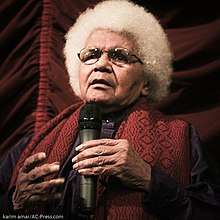Sarah Maldoror
Sarah Maldoror (19 July 1929 − 13 April 2020)[1] was a French filmmaker of French West Indies descent. She is best known for her feature film Sambizanga (1972) on the 1961–1974 war in Angola.[2]
Sarah Maldoror | |
|---|---|
 | |
| Born | Sarah Ducados 19 July 1929 Condom, France |
| Died | 13 April 2020 (aged 90) Saint-Denis, France |
| Occupation | Film director, writer |
Notable work | Sambizanga (1972) |
Early life and education
Born Sarah Durados in 1929 in Condom, Gers, the daughter of emigrants from Guadeloupe, she chose her artist's name in remembrance of Les Chants de Maldoror by Lautréamont.
She attended a drama school in Paris. Together with her husband, Angolan nationalist Mário Pinto de Andrade, she received a scholarship and studied film with Mark Donskoi in Moscow in 1961–62 where she met Ousmane Sembène.[3]
Career
After her studies, Maldoror, worked as an assistant on Gillo Pontecorvo's acclaimed film, The Battle of Algiers (1966).[4] She also worked as an assistant to Algerian director Ahmed Lallem.
Maldoror's short film, Monangambee (1968), was set in Angola, based on a story by Angolan writer José Luandino Vieira. The title of this 17-minute film, Monangambée, refers to the call used by Angolan anti-colonial activists to signal a village meeting. The film was shot with amateur actors in Algeria. It tells the story of a poor woman who visits her husband, who is imprisoned in the city of Luanda.[5] The film was selected for the Director's Fortnight at Cannes in 1971, representing Angola.[6][7]
Her first feature film, Sambizanga (1972), was also based on a story by Vieira (A vida verdadeira de Domingos Xavier), and is set in 1961 at the onset of the Angolan War of Independence. Guardian film writer Mark Cousins included Sambizanga in a 2012 list of the ten best African films, calling it "as bold, as well-lit as Caravaggio paintings".[8]
Maldoror is one of the first women to direct a feature film in Africa; therefore, her work is often included in studies of the role of African women in African cinema.
Maldoror died on 13 April 2020, at the age of 90, from COVID-19 during the COVID-19 pandemic in France.[9]
Awards
- Maldoror won a Tanit d'or at the 1972 Carthage Film Festival
- Maldoror received the National Order of Merit (France) from the Government of France[10]
Filmography
- Monangambé, 1968
- Des fusils pour Banta (Guns for Banta), 1970
- Carnaval en Guinée-Bissau (Carnival in Guinea-Bissau), 1971
- Sambizanga, 1972
- Un carneval dans le Sahel (Carnival in Sahel), 1977
- Folgo, Ile de Feu
- Et les chiens se taisaient (And the dogs kept silent)
- Un homme, une terre (A man, a country)
- La Basilique de Saint-Denis
- Un dessert pour Constance, 1983
- Le cimetière du Père Lachaise
- Miro
- Lauren
- Robert Lapoujade, peintre
- Toto Bissainthe, Chanteuse
- René Depestre, poète
- L'hôpital de Leningrad, 1983
- La littérature tunisienne de la Bibliothèque nationale
- Un sénégalias en Normandie
- Robert Doisneau, photographe
- Le racisme au quotidien (Daily life racism), 1983
- Le passager du Tassili (The Tassili passenger), 1987
- Aimé Césaire, le masque des mots (Aimé Césaire, word as masks), 1986
- Emmanuel Ungaro, couturier
- Louis Aragon – Un masque à Paris
- Vlady, peintre
- Léon G. Damas, 1995
- L'enfant-cinéma, 1997
- La tribu du bois de l'é (In the time of people)
Documentary about Sarah Maldoror
- Sarah Maldoror ou la nostalgie de l’utopie by Anne Laure Folly, France /Togo, 1998.
See also
- Women's Cinema
References
- Mourinha, Jorge; Lucinda Canelas (13 April 2020). "Morreu Sarah Maldoror, uma pioneira do cinema africano". PÚBLICO.
- "Angola: Brutality Betrayal". Village Voice. 6 December 1973. Retrieved 5 August 2010.
- "Maldoror". www.africanwomenincinema.org.
- Sayre, Nora (22 November 1973). "Movie Review – Sambizanga (1973)". The New York Times. Retrieved 29 January 2016.
- Dembrow, Michael. "Sambizanga and Sarah Maldoror". Archived from the original on 15 March 2012. Retrieved 22 August 2012.
- "Sambizanga Review". MUBI. Retrieved 22 August 2012.
- "Monangambee – Quinzaine 1971 / Court métrage". Quinzaine des Réalisateurs.
- Cousins, Mark (3 September 2012). "African cinema: ten of the best". The Guardian.
- "Sarah Maldoror, pionnière du cinéma panafricain, décède du coronavirus". Outre-mer la 1ère (in French). 13 April 2020.
- "Remise de l'ordre national du mérite à Sarah Maldoror par Frédéric Mitterand". Vimeo. 27 July 2011. Retrieved 22 August 2012.